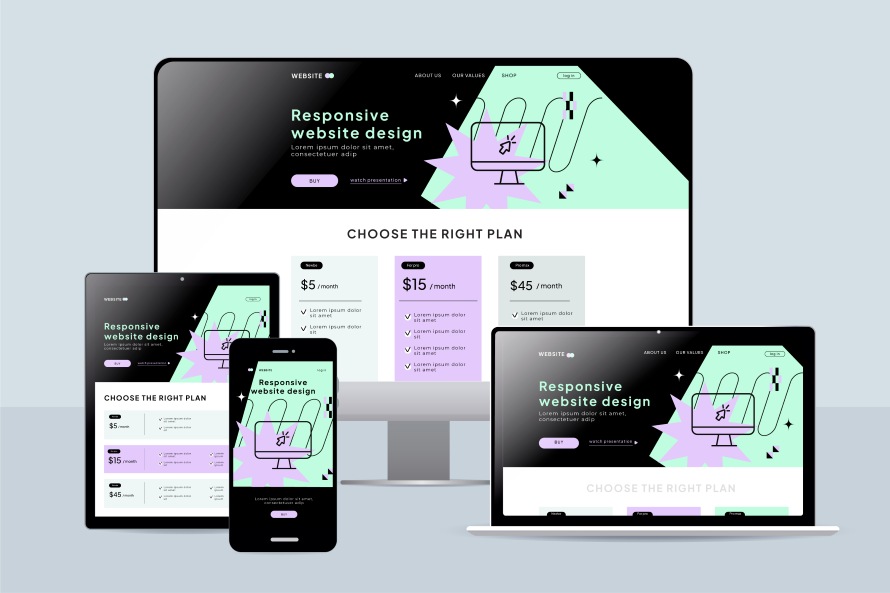
Must-Have Features for a Small Business Website
If you're a small business owner in the UK trying to grow online, having a professional website isn’t optional anymore — it’s essential. But just throwing up a few pages won’t cut it. You need a high-converting, SEO-optimised, user-friendly site that builds trust and gets results.
In this complete guide, we’ll walk you through the must-have features every small business website should include in 2025. Whether you're building a new site or improving an existing one, this will help you avoid costly mistakes and get ahead of your competition.
1. Mobile-Responsive, Fast & Accessible Design
Over 60% of all UK web traffic now comes from mobile devices (Statista UK). If your site isn’t mobile-optimised, you’re losing leads daily. Your website should:
- Automatically adapt to all screen sizes — mobile, tablet, and desktop
- Load in under 3 seconds (ideally under 2)
- Be accessible to users with disabilities (WCAG 2.1 AA compliance)
Use tools like WAVE and Google Lighthouse to audit your site's responsiveness and accessibility. Under the UK Equality Act 2010, non-accessible websites can even face legal action.

2. Clear Branding, Intuitive UX & Simple Navigation
Users take less than 0.05 seconds to form an opinion about your site. If your branding is off or the navigation is confusing, they’ll bounce before reading a word.
Make sure your website includes:
- Consistent brand colours, logo, and typography
- A clean header with max 5–7 main menu items
- Visible contact info on every page
Visitors should know who you are, what you offer, and how to contact you — all within 5 seconds of landing on your homepage.
3. Conversion-Focused CTAs, Forms & Booking
Great design means nothing if your website doesn’t convert visitors into leads. Every page should guide users to take action. Strong call-to-actions (CTAs) are critical.
Include:
- Clear CTA buttons: “Book a Free Call,” “Get a Quote,” “Download Guide”
- Short, frictionless contact forms (name, email, phone, message)
- Online booking or checkout system (especially for service businesses)
Place CTAs above the fold and repeat them smartly across the page. Use action-driven verbs that match your business goals.
4. SEO & Content Optimisation from Day One
What’s the point of a beautiful site if no one sees it? SEO ensures your site ranks on Google when people search for what you offer.
Essential on-page SEO features include:
- Unique title tags and meta descriptions on every page
- Keyword-optimised headings (H1, H2, etc.)
- Alt text on all images
- Descriptive URL structure (e.g. /plumbing-services-london)
Also, add a blog to cover helpful topics in your niche. This boosts authority, ranks for long-tail keywords, and gives you content for social media.
5. Trust Signals: Reviews, Certifications & Social Proof
In 2025, trust is currency. People buy from businesses they feel confident about — especially online.
Your website should showcase:
- Client testimonials with real names and photos
- Case studies with outcomes
- Trust badges: Google Reviews, Trustpilot, industry certifications
- Press mentions or partner logos (if available)

6. GDPR, Cookie Consent & Website Security
GDPR compliance isn’t optional in the UK. You need to protect user data and inform visitors about how you use cookies.
Include these features:
- SSL certificate (HTTPS) for all pages
- GDPR-compliant cookie consent banner
- Privacy Policy and Terms & Conditions pages
- Regular backups and plugin updates (if using CMS like WordPress)
This isn’t just about ticking boxes — security builds trust and protects your business reputation.
7. Analytics, Speed, and Performance Monitoring
You can’t improve what you don’t measure. Set up tools like:
- Google Analytics – to track user behaviour
- Hotjar – to see where users click or drop off
- PageSpeed Insights – to monitor and optimise loading speed
Speed impacts both UX and SEO. Compress images, use lazy loading, and consider a CDN if traffic grows.
8. Social Media Integration
Your website should link directly to your social media profiles and make it easy for visitors to share your content.
- Embed Instagram, Facebook, or LinkedIn feeds
- Add social share buttons to blog posts
- Include your main platform icons in the footer
This bridges your online presence and increases brand visibility across platforms.
9. Flexible CMS & Scalability Options
Pick a platform that can grow with your business. If you're starting lean, builders like Wix or Squarespace work — but they limit you long-term. WordPress or Shopify offer better control and scalability.
Make sure your platform:
- Allows easy content updates (CMS)
- Integrates with tools like CRMs, email platforms, booking systems
- Can scale to support new services, blogs, or shop features
Expect to invest around £1,000–£5,000+ for a quality UK small business website — more if it includes advanced features or e-commerce.
Frequently Asked Questions
What pages should a small business website have?
At a minimum: Home, About, Services, Contact, and Legal pages (Privacy Policy, T&Cs). Blogs and FAQs also help boost SEO and build authority.
Do I need SEO if I'm just starting out?
Yes — SEO helps your website get discovered organically. It’s the most cost-effective long-term marketing channel for local UK businesses.
How much should a small business spend on a website?
For a UK business, expect to spend £1,000–£5,000 for a professionally designed website with all essential features. Avoid cheap builders that lack SEO or flexibility.
Can I build it myself?
If you’re tech-savvy, yes — platforms like WordPress or Shopify allow DIY builds. But for most, hiring a professional ensures your site is optimised, secure, and built for growth.
What’s the biggest mistake small businesses make?
Launching a website without clear CTAs, SEO optimisation, or conversion tracking. It might look pretty — but won’t deliver leads.
Final Thoughts: Build a Website That Works for You
Your website should be your best salesperson — working 24/7 to attract leads, build trust, and grow your business. Don’t cut corners. Invest in features that truly move the needle.
If you're unsure where to start, we offer a free 1:1 strategy call to help you plan your website project the right way — no sales pitch, just real help.
Book Your Free Strategy Session Today »

Written by Robiul Alam
Founder of Websitedesigninlondon.com, with over 9 years of digital marketing and SEO expertise helping UK businesses thrive online.